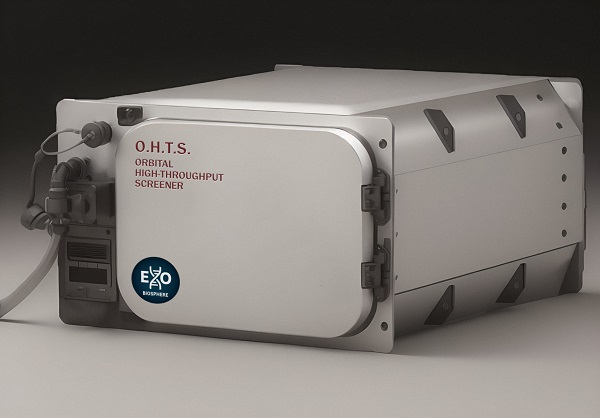 Credit: Exobiosphere
Credit: Exobiosphere
Luxembourg-based biotechnology startup Exobiosphere recently made two announcements: the contract research organisation dedicated to drug discovery in space has raised €2 million in a seed round to scale its orbital high-throughput screening platform; it also announced its participation in Vast's Haven-1 Lab as an official payload partner.
Seed round
The seed round was led by Expansion Ventures, a €200 million pan-European venture capital fund backing category-defining founders in aerospace and defence. Significant participation came from Expon Capital, a Luxembourg-based firm investing in "transformative technologies with the potential to reshape entire industries", according to Exobiosphere. The round also attracted Space Data Inc., a Japanese company "pioneering real-time digital twin technology for Earth and space systems".
The funding will accelerate development of Exobiosphere's Orbital High-Throughput Screener (OHTS), an autonomous, standardised lab automation platform built for microgravity. With drug failure rates exceeding 90% and development timelines often surpassing a decade and costing billions, pharmaceutical research and development (R&D) remains expensive and inefficient, noted Exobiosphere. The OHTS is described as offering a "powerful alternative", leveraging space conditions to enhance disease modelling, reduce false positive results, increase success rates and feed valuable data to AI based drug discovery models which are expected to further accelerate the development of more effective therapies.
This raise reportedly builds on key momentum for the company, including the launch of its R&D hub at the House of BioHealth Incubator in Esch-sur-Alzette and a grant by the Luxembourg government through a European Space Agency (ESA) contract in the Luxembourg national space programme, LuxIMPULSE.
"Space is not just the next frontier for exploration - it’s the next frontier for medicine," said Kyle Acierno, CEO of Exobiosphere. "We’re building critical infrastructure that lowers the barrier to entry for pharma and biotech companies. This investment marks a pivotal step in making microgravity drug discovery accessible, scalable and commercially viable."
"Exobiosphere brings a fresh, high-impact perspective to biotech and space," noted Ted Elvhage, founding partner at Expansion Ventures. "It’s not just about taking experiments to space - it’s about redefining how we design and validate therapies on Earth."
"We invested in Exobiosphere because they’re unlocking an entirely new dimension for biotech innovation. Their platform not only accelerates the discovery and validation of transformative therapies but also bridges critical gaps faced by pharma through microgravity-enabled insights that are simply unattainable on Earth," added Jérôme Wittamer, founding partner at Expon Capital.
With the funding in place, Exobiosphere said it would complete technical validation of its OHTS system, grow its customer pipeline, expand its engineering and bioinformatics teams and launch the platform to space, while at the same time expanding into the US.
Haven-1 Lab
Joining Japan Manned Space Systems Corporation (JAMSS) and Interstellar Lab, Exobiosphere will install its Orbital High-Throughput Screening Device (OHTS) aboard Haven-1, the world's first commercial crewed space station. The startup said in a press release that this "historic collaboration marks a pivotal step in unlocking microgravity’s potential to speed up drug development, reduce late-stage R&D failures and transform how breakthroughs in medicine and healthcare are achieved on Earth and beyond".
Through this partnership, Exobiosphere's OHTS will conduct automated cell culture experiments in microgravity that can accelerate cell growth and uncover cellular behaviours not observable under Earth’s gravity. Results from these experiments are expected to provide pharmaceutical, biotech and healthcare partners with data-driven insights to develop safer, more effective therapeutics.
"Vast’s Haven-1 Lab offers a state-of-the-art research environment to integrate our high-throughput screening platform," explained Kyle Acierno. "Microgravity provides a powerful vantage point for investigating disease at the cellular level. By installing OHTS on Haven-1, we aim to dramatically speed up the discovery of new drug candidates and reshape how we approach healthcare on Earth and in space."
"We’re excited to welcome Exobiosphere aboard Haven-1 as we prepare to make history with the world’s first crewed commercial lab in space," commented Max Haot, CEO of VAST. "This collaboration not only demonstrates the global value of microgravity research and Haven-1’s role in driving cross-border innovation and discovery, but it signals an unprecedented opportunity for us to show that space is the key to acceleration, safety and efficiency in life-changing and life-saving drug development."
The Haven-1 Lab is on track for deployment in May 2026 and is already nearing full capacity. Exobiosphere noted that it has "joined other leading research partners in harnessing the commercial low-Earth orbit ecosystem to pursue international collaboration, groundbreaking scientific insights and commercial advancements that will benefit life on our home planet as well as future spacefarers".








